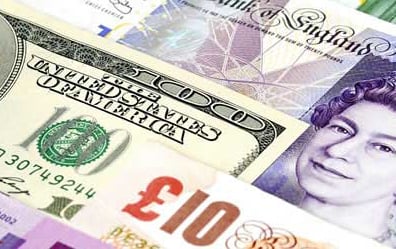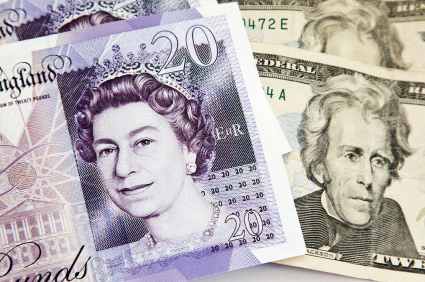After rallying last week following strong economic data, and thereby providing another reminder to investors that the UK economic outlook remains robust, the GBPUSD has suffered from a sudden sell-off with the bears on full alert after the pair closed below 1.55. While the UK economic outlook is attractive to traders, the inflation woes and continually pushed back interest rate expectations have limited Pound/Dollar upside gains.
Even before the UK economy encountered unexpected inflation risks, the Bank of England (BoE) has contained stubborn views on inflation with these views becoming even stronger over recent months. There is optimism that the BoE might still be able to raise UK interest rates during the first quarter of 2016, but I see this as ambitious, and with the current inflation readings we would be lucky to see a rate increase before the second half of 2016.
Sentiment towards the Sterling has also likely been weighed down by a leaked email exposing that the BoE are already investigating the potential economic risks to the UK in the event of a possible Brexit. However, I see it as a positive to learn that the BoE are already investigating the possible risks to the UK economy if the UK were to leave the EU. Could you imagine if the BoE hadn’t planned the possible impacts to the UK economy until a Brexit appeared a strong likelihood? Not only would the sell-off in the Pound been extreme, but the BoE would have found itself under huge scrutiny for poor planning.
Where will the Pound/Dollar trade over the upcoming days? From a technical standpoint, closing below 1.55 changes the outlook to bearish with this meaning the pair is vulnerable to further losses. Other than a preliminary GDP reading, UK economic data is low in volume this week with the US economic data flow being much busier. This means that the Dollar will provide direction for the Pound over the upcoming week.
Advertisement
Speaking of the Dollar, Janet Yellen reignited interest from buyers at the conclusion of last week when she repeated the Federal Reserve’s ongoing commitment towards raising US interest rates “at some point this year”. With fragilities in the US economy being frequently exposed there were rising concerns that the Federal Reserve would have to delay raising rates until 2016, but the comments from Yellen would have cooled down investor anxiety. While Yellen raised investor sentiment towards the Dollar, I still think the currency remains vulnerable to further losses down the road, and the comments regarding raising rates “at some point this year” does provide flexibility for US interest rate expectations to be pushed further back than September.
The Dollar will be at risk today if the Durable Goods and Consumer Confidence readings continue to point out that US economic momentum is slowing down. If you were to ask me, the Durable Goods data should be seen as higher-risk because another weak reading will heighten the possibility for future GDP readings to continue drifting lower. While I do understand the Consumer Confidence readings are also important with consumer spending representing such a vital component of the US economy, I do not think a further decline in sentiment should encourage too much noise because it is not like consumers in the US are spending anyway.
The EURUSD is continuing to suffer with the pair now dropping to a fresh one-month low at 1.0930. The major concern is that we could only be less than a fortnight away from a possible Greece default, although I do think the news that anti-austerity parties were declared victorious in several local election across Spain is also weighing on investor sentiment.
Advertisement
The blueprint for anti-austerity parties to become prominent figures in European governments is emerging, with this increasing the possibility for political change within Europe. Not only do we already have the ongoing negotiations to avoid a Greece default being installed as a reoccurring risk to Euro sentiment, but UK Prime Minister David Cameron is soon to undertake his own negotiations with the EU and there are general elections in Spain at the end of December. If the anti-austerity parties being declared victorious in several location election across Spain means that we could also be looking at a possible anti-austerity government being formed at the end of the current year, then there is potential for the situation in Greece to repeat itself with this being exactly why I am still refusing to rule out the Eurodollar reaching parity by the end of 2015.
Follow Jameel on Twitter @Jameel_FXTM
For more information please visit: Forex Time
Advertisement





